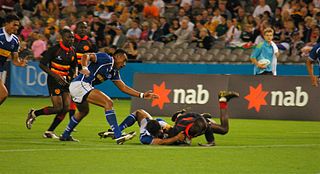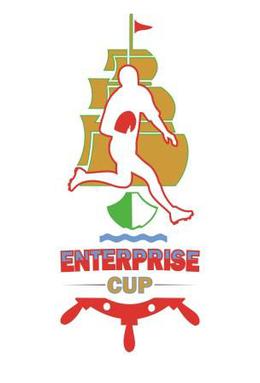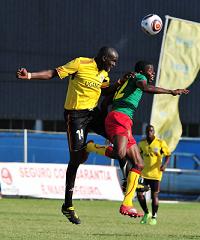Related Research Articles

East African Breweries Limited, commonly referred to as EABL, is a Kenyan-based holding company that manufactures branded beer, spirits, and non-alcoholic beverages.

Kenya Rugby Union (KRU) is the governing body for rugby union in Kenya. It was founded in 1970 and is affiliated to Rugby Africa and the international governing body World Rugby.
The Safari Sevens is an annual rugby sevens tournament held in Nairobi, Kenya. The Safari Sevens is open to international representative sides, professional and amateur clubs, invitational teams, university and school teams.

The Uganda national rugby union team are a national sporting side of Uganda, representing them at rugby union. Rugby union was introduced by the British during colonial rule and Uganda played their first international game against Kenya in 1958. They have not yet qualified for the Rugby World Cup.

The Kenya national rugby union team, commonly known as the Simbas, is the country's national team managed by the Kenya Rugby Union. The team plays in red, green, and black jerseys with black or white shorts. The Simbas represent Kenya in the Africa Cup and various other tournaments across the continent. They currently rank 34 in the World Rugby Rankings and fourth in Africa. Kenya is yet to qualify for the Rugby World Cup.

Rugby union in Kenya is a popular sport, in particular due to the success of the Kenya national rugby sevens team in the rugby sevens format, and tournaments such as the Safari Sevens, which has been growing yearly, and now includes numerous international teams.

The Tanzania national rugby union team represents Tanzania in international rugby union. They are known as the Twigas. Tanzania is a member of the International Rugby Board.

The Elgon Cup is contested between the rugby union teams of Kenya and Uganda. The men's and women's teams of these countries each compete annually for their respective cups on a Home-and-Away basis. The competition and the cups are named after Mount Elgon, a mountain on the border of the two countries.

Rugby union in Uganda has been played since colonial times when it was introduced by the British. The governing body is the Uganda Rugby Football Union.
Rugby union in Tanzania is a minor but growing sport.

Established in 1950, the East Africa rugby union team is a multi-national rugby union team drawing players from Kenya, Uganda and Tanzania, though the vast majority of these came from Kenya which has traditionally been the strongest rugby playing nation in the region. The team has played against incoming international, representative and club touring sides and it conducted seven tours between 1954 and 1982.

The RFUEA Ground is a rugby union stadium located on the Ngong Road in Nairobi, Kenya. It was purpose built to be the home of the national team and to serve as the headquarters of the Rugby Football Union of Kenya (RFUK).[a] Coincidentally, the RFUEA ground has another parallel with Twickenham Stadium in the United Kingdom in that it also serves as the home ground for the Kenya Harlequin Football Club, just as their sister club the London Harlequins once played at Twickenham.

The Rugby Football Union of East Africa (RFUEA) is an umbrella union for the Kenya Rugby Football Union, Tanzania Rugby Football Union and Uganda Rugby Football Union. It owes its existence to the fact that, prior to independence, Kenya, Tanzania and Uganda were either a protectorate or mandate of the British Empire. It now has little to do with the direct administration of the modern game but it continues to exist in order to promote and support the game in the three countries, to facilitate club competition between the three unions and to administer the RFUEA Ground and the East Africa rugby union team.
The Bamburi Super Series was an East African Rugby union competition with eight teams in total, five teams from Kenya two from Uganda and one from Tanzania (Twigas) that is currently defunct. It is closely based on the Super Rugby competition in the southern hemisphere. Games take place at the RFUEA Ground in Nairobi (Kenya), Friedkin Recreation Centre in Arusha (Tanzania) and the Kyadondo Grounds, Kampala (Uganda). Rhinos have won the most titles with four wins, and are the only team to have defended a title when they beat the Cheetahs 25–5 in the 2010 final.

The Enterprise Cup is an annual rugby union competition in Kenya, Tanzania and Uganda, though the competition frequently has the appearance of being an all-Kenyan affair as the majority of rugby clubs in the African Great Lakes region are based in this one country and frequently clubs in Tanzania and Uganda are unable to take part due to financial constraints. The original cup was donated by sailors from HMS Enterprise, who had toured British East Africa in 1928. The only years in which the competition has not been played is between 1940–1946 due to World War II and in 1987 because an international rugby competition was held on RFUEA Ground as part of the All Africa Games.

The Scorpions RFC is an invitation rugby team in East Africa that was established upon principles that have many parallels with the Barbarian F.C. in terms of values, playing style, selection policy and the lack of a home ground. The team wears black shirts and white shorts and, like the original Barbarians and the French Barbarians, players wear socks of their choice provided that they have played for the team that the socks represent.

The Anti-Assassins Rugby Union Football team (A-As) was an invitation team that selected players from the northern counties of England to play friendly charitable matches locally and to go on tour. The team was remodelled in 2004, teaming up with the Wooden Spoon Society to become the Spoon AAs.
Kyadondo Rugby Club is a rugby union ground in Kampala, Uganda.

Ivan Bukenya is a Ugandan professional footballer. Bukenya has formerly played for FC Linkoping City, Erbil FC in Iraq, Kaizer Chiefs in South Africa and East Bengal FC in India.
References
- Campbell, M; Cohen, E.J. (1960). Rugby Football in East Africa 1909-1959. Rugby Football Union of East Africa.
- Programme of Fifth Tuskers tour of Zambia. Rugby Football Union of East Africa. 1975.